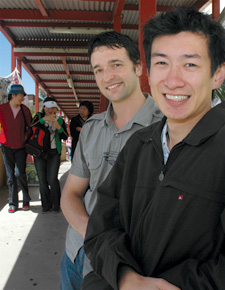 TAFE NSW has said no to chaplains but a 10-year struggle to get the ministry in all colleges will continue.
TAFE NSW has said no to chaplains but a 10-year struggle to get the ministry in all colleges will continue.
The Diocese's TAFE ministry coordinator, Craig Blacket, who is employed by Anglican Youthworks, has received a letter from TAFE Deputy Director-General Marie Persson rejecting a draft memorandum of understanding for introducing multi-faith chaplains at TAFE colleges.
The agreement would have given churches a similar level of access as they currently have in schools and universities.
Ms Persson stated that she had reviewed the concept but has "come to the conclusion that such services are best arranged at a local level' rather than through a statewide agreement.
This means the onus now falls back on colleges to agree to chaplains from local churches, with ministers needing to seek the goodwill of individual college directors, often having to start from scratch when a new director is appointed.
Grant Maple, Director of the Anglican Education Commission (a division of Anglican Youthworks) wrote the guidelines, which stated that chaplains supplement support services of TAFE colleges and contribute to the quality of life and learning of the students.
Ms Perrson said agreements need to be made at a local level to allow the individual institute directors to make arrangements that "reflect their local contexts and the needs of their students'.
Ms Perrson also rejected Mr Blacket's request to continue using the TAFE brand name with an image of the cross.
"The real issue is the place of religious education and presence in schools, TAFE and universities under a climate of pluralism," Mr Blacket says.
"I think God is getting me to see the opportunity in the adversity as we extend the diocesan mission to the management of TAFE NSW at all levels."
Mr Blacket says he will continue to seek a "solid, ongoing partnership' with TAFE.
"Given the turnover of staff, a global agreement is the only way to go," he says.
Local churches persevering in tough mission field
St Faith's, Narrabeen has employed a ministry trainee, Neil Souter, a qualified electrician, to meet with apprentice tradespeople at Brookvale TAFE.
However, the church's application for Neil to provide chaplaincy at the college was recently refused.
In a letter to St Faith's, college director Elizabeth Webb said no college within the Northern Sydney institute supports chaplaincy or has a formalised relationship with any religious group and has no intention of changing their position.
"It was disappointing, a lot of work went into it," Mr Souter says.
"We're not too sure what our next step is. If God wants us in there, we'll get in there."
For now, Mr Souter will concentrate on ministry to tradespeople at St Faith's Saturday night church, The Gathering.
Christ Church, St George has taken a different approach and enrolled two ministry trainees, Stanley Lie and Chris Nicholls (pictured) into a statement of attainment in welfare, a course that is relevant to their future roles as ministers.
"We're part of the TAFE community," Mr Lie says.
"Being enrolled, we're not outsiders. We've had lots of evangelistic opportunities."
However, reaching students and staff is difficult as they are not allowed to start a Christian group, hand out leaflets or book rooms to hold Bible studies.






















